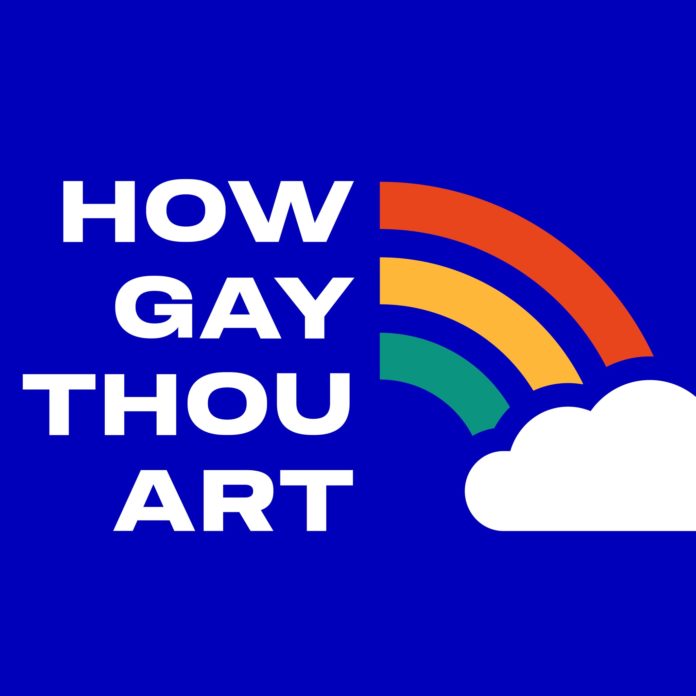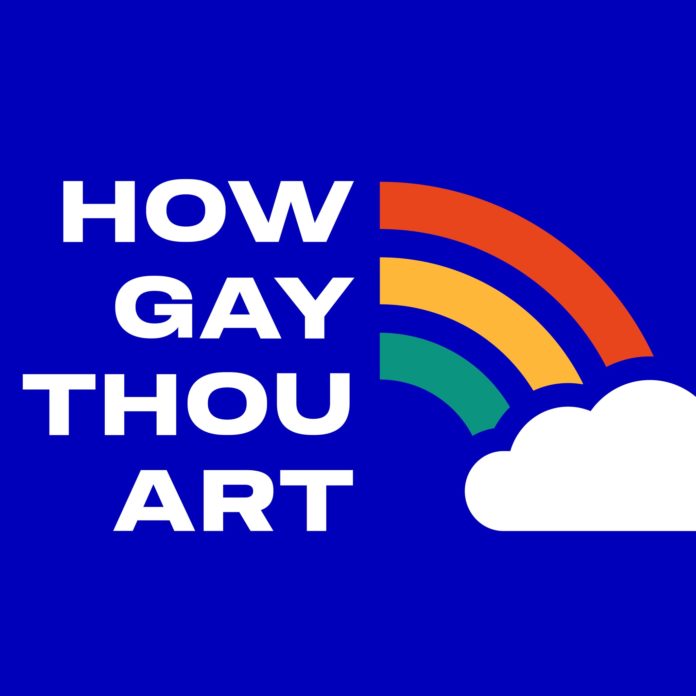
By Emma Weidmann | Staff Writer
Baylor alumni Jey Austen and Clint Keller deconstruct their evangelical upbringing while exploring gender, identity and sexuality in their new podcast: “How Gay Thou Art.” The podcast is available on all streaming services.
Keller said the podcast has a sense of nostalgia in which the hosts not only unravel their upbringings but also look back at the things they remember fondly.
“It’s revisiting a lot of the stuff we grew up with that we have fond memories of, but digging into it deeper and learning the history and the background,” Keller said. “Ever since the founding of the moral majority and the religious right by Jerry Falwell (Jr.) and Tim LaHaye, it’s sort of its own era, and that’s what we focus on.”
Austen, who is transgender and uses they/them pronouns, graduated from Baylor in 2017 with a bachelor’s degree and grew up in Waco. They said Baylor and Waco were their “whole life.” During their time at Baylor, Austen said they were still closeted, amongst a lot of “anti-queer” culture.
“Everyone else knew that I was queer except me, and no one decided to inform me,” Austen said. “I was the only one in Waco with a pixie cut.”
Keller graduated from Baylor with a master’s degree in 2016. He said being at Baylor during the time when gay marriage was legalized everywhere in the United States made for some controversy on campus.
“[Gay marriage] was kind of a big thing and a point of contention for a lot of people,” Keller said. “There was a lot of discussion around it at the time, both good and bad.”
Keller said the fact that Waco’s pride parade was organized by a church and Baylor’s creation of Prism rather than chartering Gamma means that LGBT issues on campus and in Waco have been dictated by religious groups, rather than on LGBT students’ own terms.
Prism’s constitution on its Baylor Connect page reads, “The mission of Prism serves Baylor University and its students through creating a respectful space that embraces diverse sexual identities (community) focused on continuous learning for the Baylor community, giving voice for LGBTQ+ students to the administration (care), and creating opportunities for all students to access resources through connection, belonging, and education.”
“[Prism] is a perfect example of the evangelical tendency to take something that someone else has made and make their own version of it,” Keller said. “That’s like half of what the podcast is about — how evangelical culture appropriates things from secular culture, slaps a Jesus sticker on it and says it’s a new thing when it’s not, really … [Baylor] is not acknowledging the actual problems that are happening for the queer community. The way things are today, being queer is inherently political. Trying to remove that or disconnect those two things seems very disingenuous.”
However, Austen believes that religion and the LGBT community are not inherently at odds with each other as there are affirming churches here in Waco such as UBC and Metropolitan Community Church. Austen is hopeful for the future of LGBT students at Baylor and looks forward to seeing how Prism may affect the community on campus.
“There are queer church choirs in Atlanta, there are queer Christians and I don’t think it has to disaffirm Baylor’s Baptist beliefs,” Austen said. “I mean, the word homosexual wasn’t added into the Bible until the 1940s.”
Keller said for Christians to mistreat the LGBT community is against the teachings of Jesus.
“I think we’ve become conditioned to think that Christianity and homosexuality and being trans and anything on the LGBT spectrum is at odds with Christianity, and it’s simply not,” Keller said. “To continue treating the LGBT community the way evangelicalism at large, not every single person, but as a cultural force, has treated them poorly, you have to have preference for a couple of vague verses over basically anything Jesus ever said. Are we Christians or are we people who care more about two sentences that Paul wrote?”
Both Austen and Keller feel a sense of loss surrounding their “intense” religious upbringings. Keller said he not only missed out on mainstream pop culture moments, but he also felt that he was behind his peers in science.
“I felt two steps behind my entire adult life in a lot of ways because I learned Young Earth Creationism,” Keller said. “I didn’t learn about evolution until I was like 23 … It would have been nice to not have to unlearn and then relearn so much stuff as an adult.”
Austen said the feeling of loss goes a level deeper than pop culture and education.
“There’s so much family that I don’t get to have because of who I am,” Austen said. “That’s a big one.”
Austen said “How Gay Thou Art” is an opportunity for LGBT people to have more representation in media and to show younger members of the community that there are people like them out there. Austen and Keller want their audience to know that despite the trauma they went through from growing up in an evangelical setting, it does get better.
“Seeing how the church is targeting trans people, I being a trans person myself and having grown up in the church, I feel like it’s important for trans people to take the mic back … It gets better. There’s so many more opportunities. You get to express yourself, you get to succeed, you get to be independent.”








